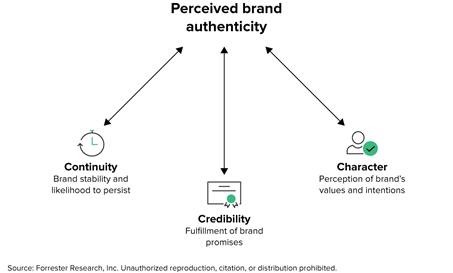Consumers Crave Authenticity, And CMOs Can Deliver
As the age of misinformation and slew of dubious corporate claims threaten consumers’ trust in brands, consumers are desperate for authenticity. While conventional wisdom suggests that authenticity means “being yourself,” that quickly breaks down when CMOs translate the sentiment into action. In our new report, The Algorithm Of Authenticity, we synthesize consumer data, industry case studies, and academic research to equip CMOs with an operational understanding of authenticity and a framework to build it. Our analysis reveals that:
- Authenticity is real and definable. Forrester defines authenticity as the following:
Perceived brand authenticity is a function of what a company does and what a company says about what the company is.
- There are three key drivers of perceived authenticity: continuity, credibility, and character.

- CMOs who maximize perceptions of authenticity drive commerce. Authenticity communicates brand value, strengthens the relationship between consumers and brands, and measurably improves customer experience quality. Forrester’s data shows that 71% of US consumers say that they can relate to authentic brands and therefore want to back them, and 70% report that authentic brands give them a “stronger feeling of confidence.”
Building perceived brand authenticity requires a cohesive and coordinated plan around what the brand does, says, and stands for. CMOs hold the most strategically positioned role in the C-suite to tackle this initiative. Read the full report to understand how to express continuity, credibility, and character to drive authenticity, and I invite you to connect with me through a Forrester inquiry or guidance session to talk more about what this means for your brand.
